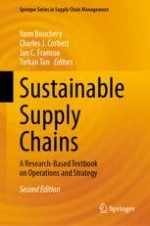2024 | OriginalPaper | Buchkapitel
6. Green Inventory Management
verfasst von : Johan Marklund, Peter Berling
Erschienen in: Sustainable Supply Chains
Aktivieren Sie unsere intelligente Suche, um passende Fachinhalte oder Patente zu finden.
Wählen Sie Textabschnitte aus um mit Künstlicher Intelligenz passenden Patente zu finden. powered by
Markieren Sie Textabschnitte, um KI-gestützt weitere passende Inhalte zu finden. powered by
